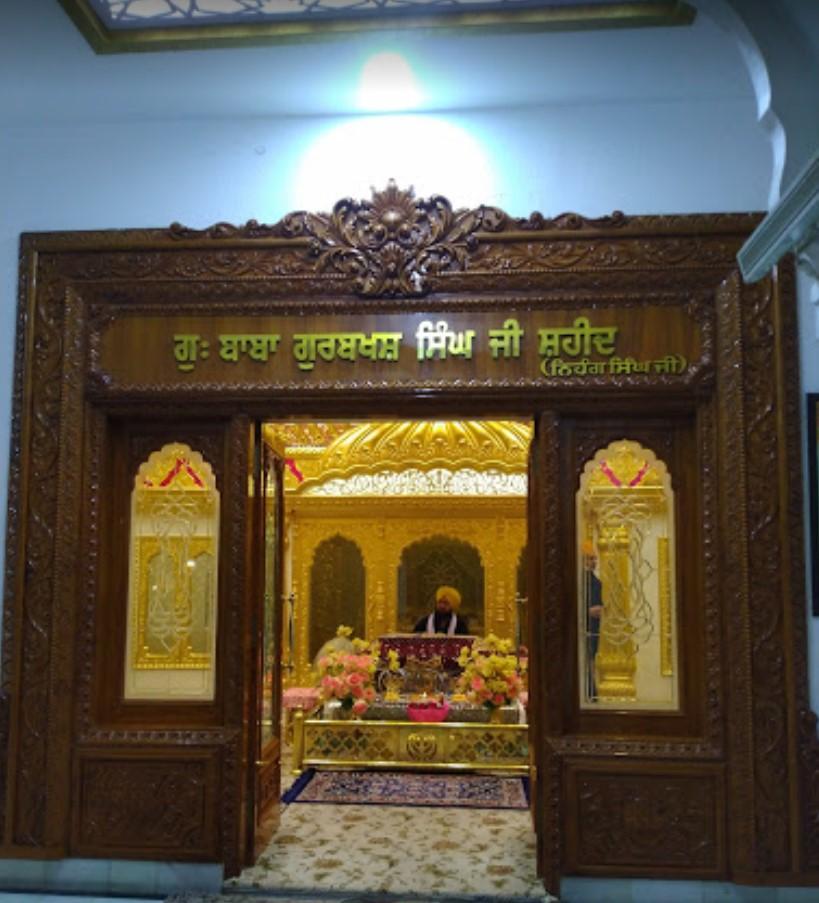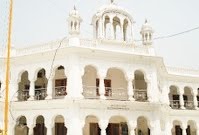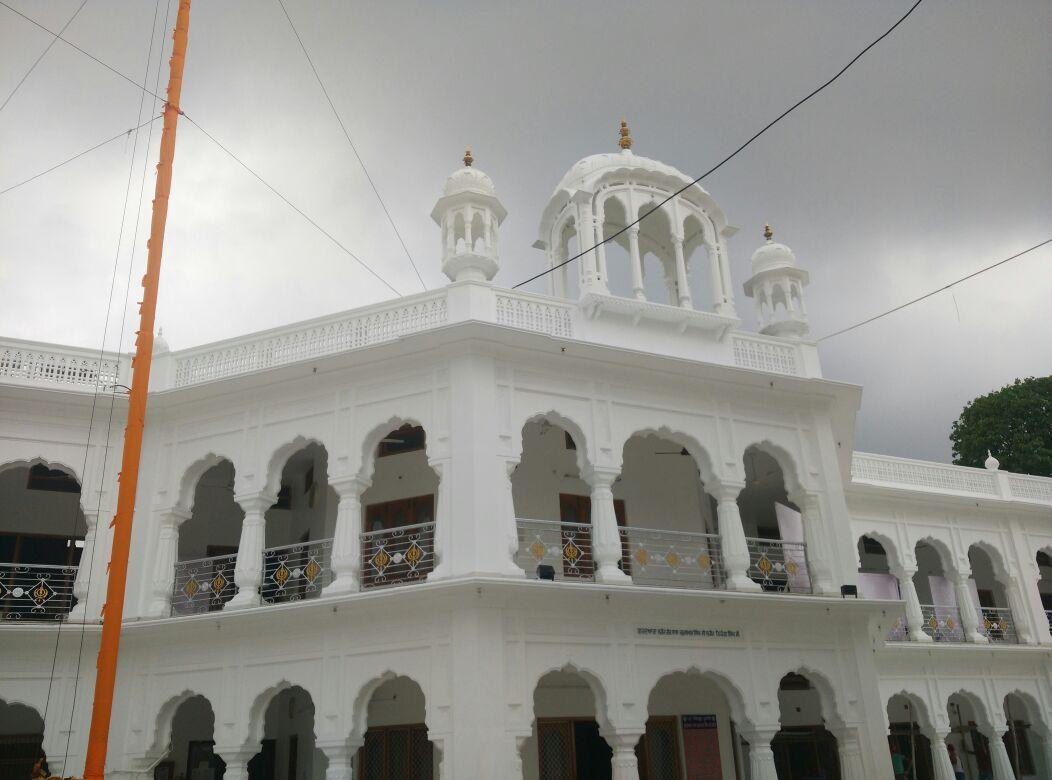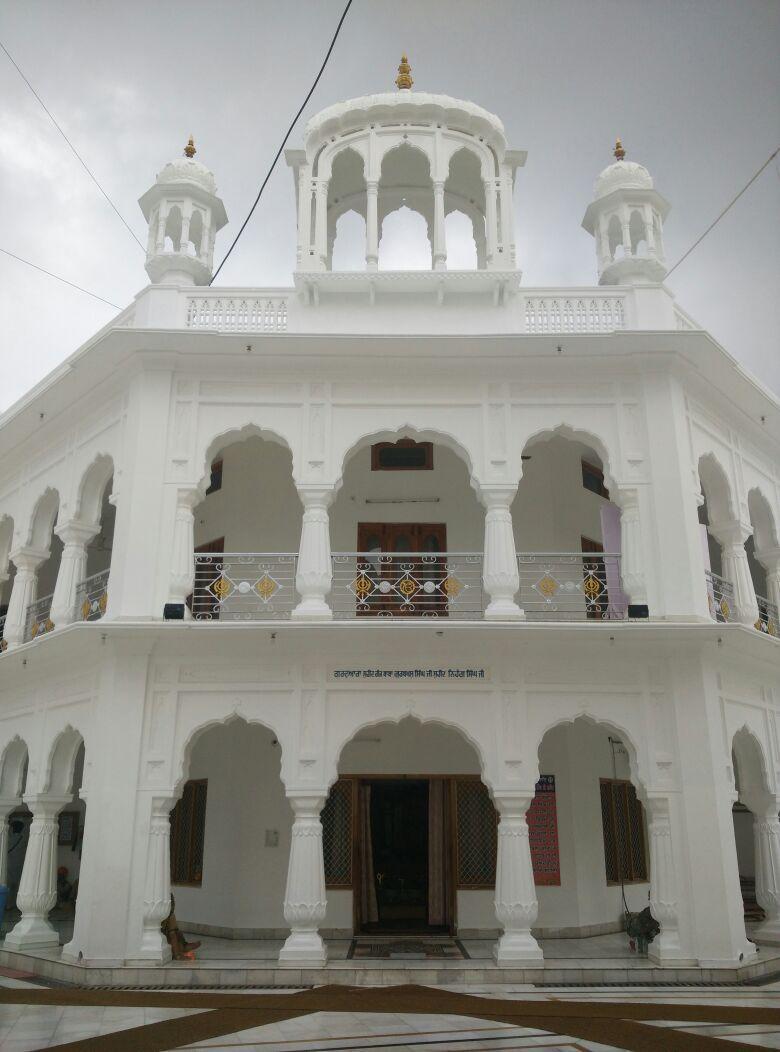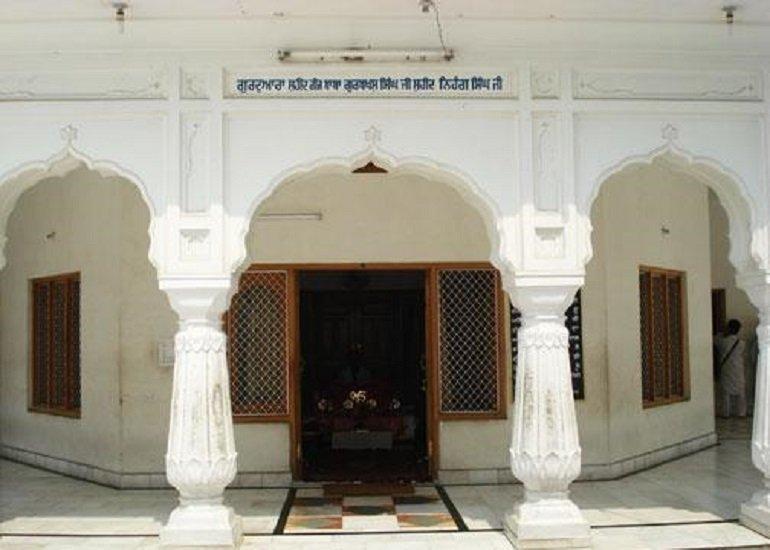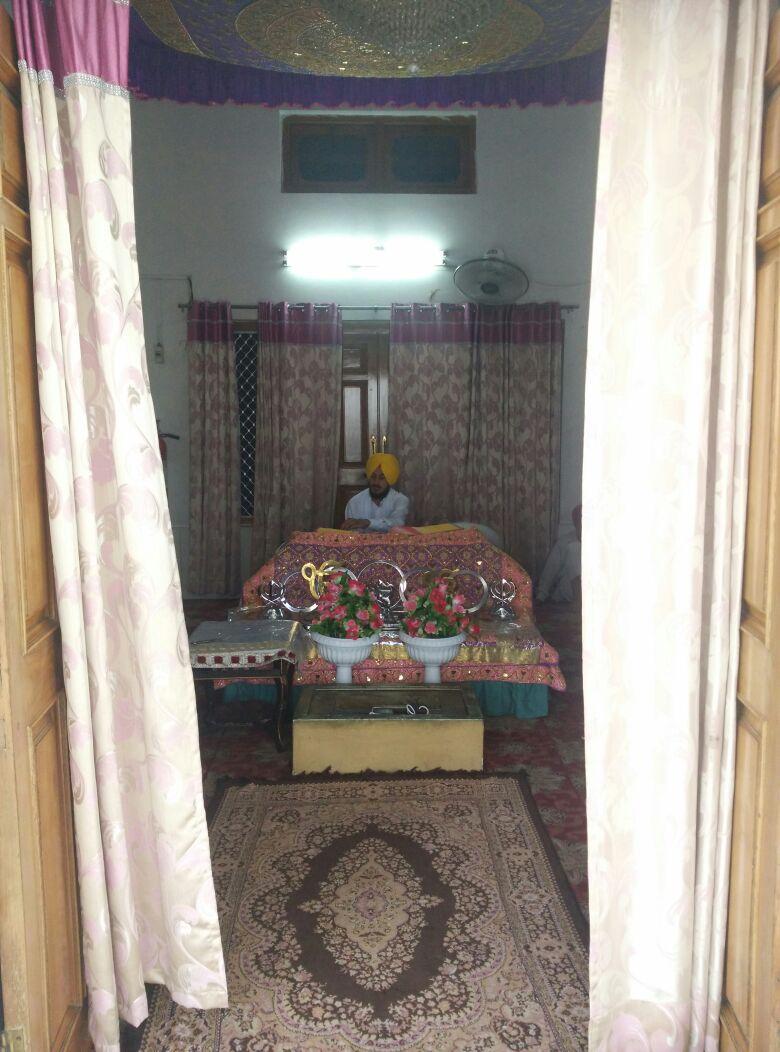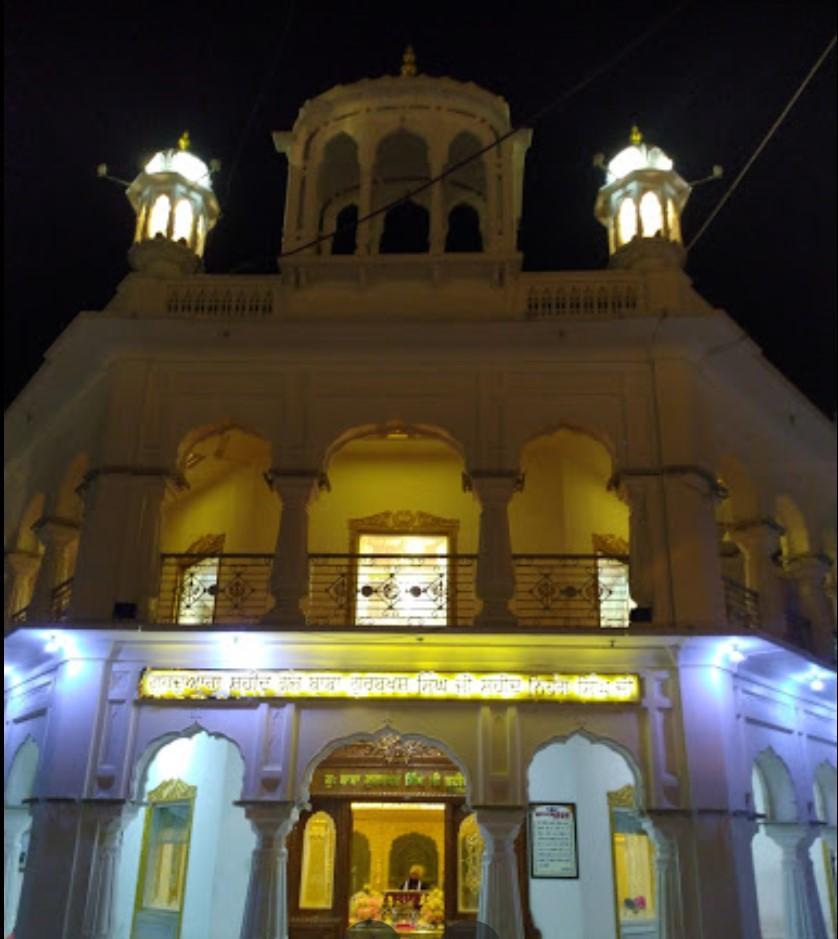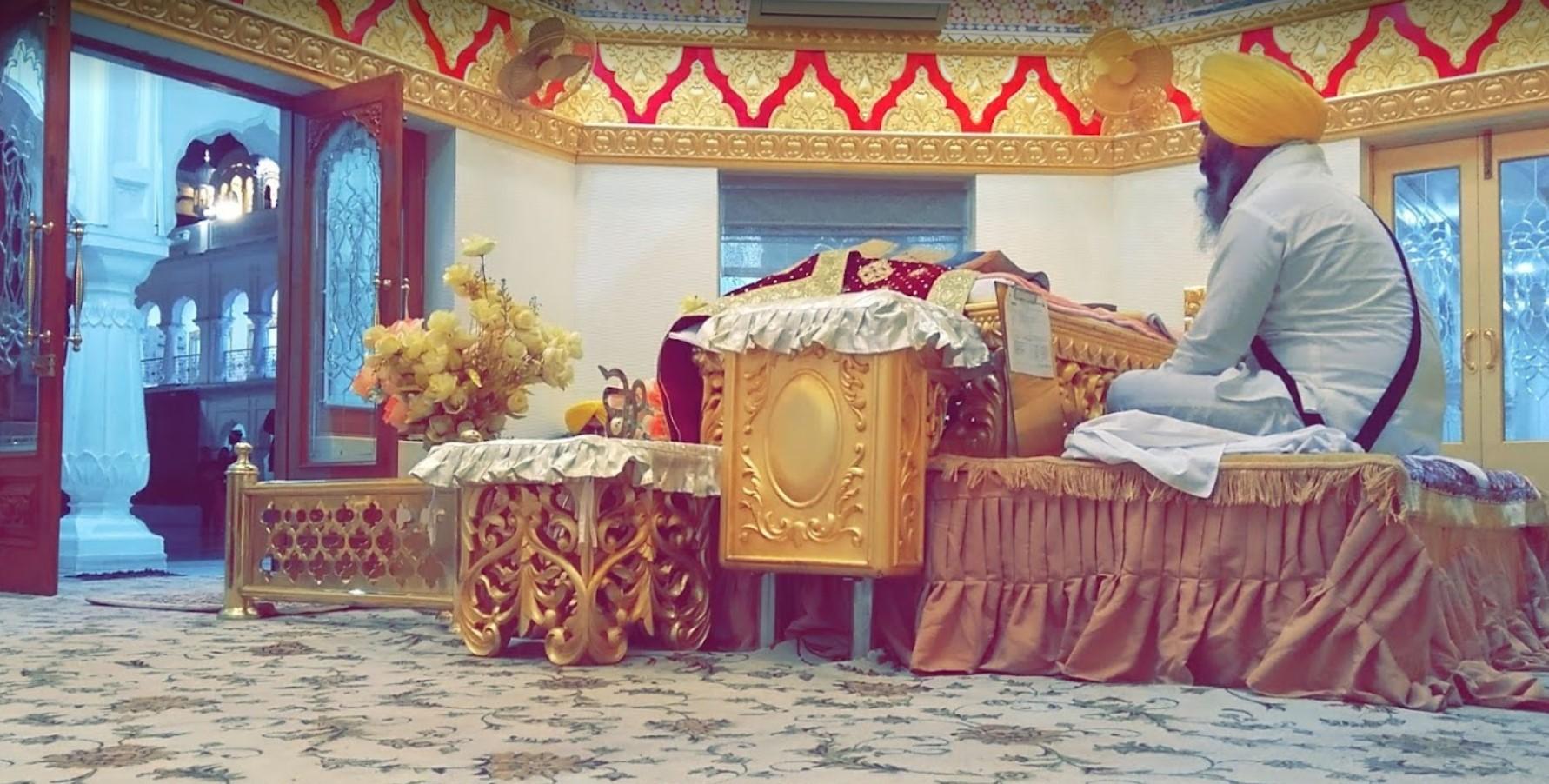Gurudwara Shaheed Ganj Baba Gurbaksh Singh Ji
Gurdwara Sri Shaheed Ganj Baba Gurbaksh Singh is located in the Sri Harmandir Sahib complex to the rear of Sri Akal Takht.
In 1764, Ahmad Shah Abdali attacked Amritsar. Baba Gurbaksh Singh Ji with 30 Sikhs fought to defend Sri Harmandir Sahib and won martyrdom.
1st December marks the day when Baba Gurbaksh Singh Ji gave an amazing Shaheedi defending Sri Darbar Sahib in Amritsar in 1764.
Baba Ji was of village Leel near Sri Amritsar. His father’s name was Bhai Dasaundha Singh Ji and mother’s name was Mata Lachmee Kaur Ji.
Baba Ji’s parents served Satguru Gobind Singh Ji and Baba Ji received amrit at the age of 11, due to the inspiration of Bhai Mani Singh Ji. He spent time with Baba Deep Singh Ji and Bhai Mani Singh Ji and became a very good scholar and warrior.
Baba Gurbaksh Singh was always dressed in blue Bana and kept a very strong Rehit (discipline). He would awake at Amrit-vela (early hours before sunrise) and do ishnaan (bathe). Then, while reciting Gurbani, Baba Ji would tie his tall dastar. Baba Ji loved Sarbloh (pure iron) and would adorn his body and dastaar with iron Shastars (weapons) and armour.
Every Amrit-vela Baba Ji sat in the diwan at Sri Akal Takht Sahib. Rich or poor, he greeted all people with the same respect. He had absolutely no worldly aspirations or greed. Whenever there was a battle, Baba Ji would be in the forefront carrying the the Nishan Sahib (Sikh flag) and advancing to the forward to the beat of the nagaara (war drum)
The Khalsa had scattered to the jungle and mountain areas when the Afghan invader, Ahmed Shah Abdali, brought his army through Punjab in 1765. It was Abdali’s 10th invasion. At Amritsar, the Sarbat Khalsa (the collective gathering of all the Khalsa) gathered one day and after the night diwan, decided to abandon Amritsar and leave together as a group for Malwa (south Punjab).
After the decision had been made, Baba Gurbaksh Singh rose and addressed the Singhs. Baba Ji asked whether there is any Sikh who is devoted to Naam and has strong Rehit that is willing to sacrifice themselves and spill their blood for the Chardi Kala of the Panth. The Singhs replied, “Baba Ji, is there any Singh better for this than you? There is no one with more kamaee (spiritual wealth). No one else has the power to abandon their body and go to Dargah (Court of the Lord) like you do. No one else’s request will be more acceptable to Waheguru than yours.” Baba Ji listened to these words and then bowed his head and agreed to the request.
Baba Ji then called out, “I want to be Shaheed! If there is any other Gurmukh who wishes to come with me to Dargah, then let them also come. When there is a marriage, the groom goes with his Sarbaalha (best man) and with a large baraat (marriage party). I am going to marry the bride of Death. Are there Singhs who would be my Sarbaalhas?” Hearing Baba Ji’s call, many Singhs rose and stood with Baba Ji to become the “Sarbalhas” and the others joined saying they would be the “Baraat” (marriage party).
Hearing of the advance of Abdali from Lahore, some people left Amritsar. Only about 30 Singhs now remained who were all Chardi Kala Naam Abhyasee (repeaters of the Divine-Name) Gursikhs. They prepared for their death like a groom prepares for his wedding. They all had new cholas (dresses) sewn. Some decided to sew blue, and others wore white and others saffron. After bathing in the holy Sarovar (pool of nectar), along with the other 30 Sikhs, Baba Ji offered Karah Parshaad at Sri Harmandir Sahib and did Ardaas: “Satguru Ji may our Sikhi last with our Kesh (hair) intact until our last breath.”
After taking Hukam (edict) from Sri Guru Granth Sahib Ji and reciting “Ghoriaa’n” (a prayer about marriage), the Sikhs stated that they were going to wed death. They returned to Sri Akal Takht Sahib to listen to kirtan of marriage hymns and await the enemy. In this way, the entire night passed in listening to kirtan. At day break, the enemy had arrived.
The Nishan Sahibs were furling and the beat of nagaraas was echoing. The Singhs were like grooms anxious to marry a beautiful wife and seeing the time come closer, becoming more and more excited. The Singhs were surrounded on all four sides and the Afghans began to close in. Baba Ji called out to all the Singhs, “Singhs! Step forward and embrace martyrdom! If we step forward, our honour remains intact, if we step back, they will say we are retreating! Do not look for assistance anymore, just go forward! Now go forward and give your heads!” Hearing Baba Ji’s cry, the Singhs all charged forward. They fell upon the Afghans like a lion on deer.
Wherever the Singhs stood their ground against the Afghans, they eventually fell. Afghan reinforcements also arrived. Not one Singh stepped back. Some Afghans even began to run away. Many Singhs standing with Baba Ji fell to the rain of bullets. Baba Ji then took out his heavy Tegha (double-edged sword) and ran towards the enemy. He swung his Tegha with such force that it cut through the armour of the Afghans. The Afghans continued to fall back and began to wonder whether these few Singhs would cause their defeat. They could not bear the brunt of the Singhs’ sword blows. They fell back and began to fire bullets and arrows.
Baba Ji’s body was pierced by many bullets and arrows and his wounds could not be counted. But neither did the Singhs accept defeat nor would they acknowledge any pain. Although tired and weak from loss of blood, Baba Ji was careful that no one would say he retreated. Baba Ji called to the remaining Singhs, “Singhs! Do not shame the Bana we wear! May our Shaheedi’s be perfect and may we fall in the battlefield!”
By this time, even more Afghan reinforcements arrived. The new Afghans surrounded the wounded Baba Ji and pierced him with their long spears. Baba Ji fell to his knees. Not willing to accept anything but martyrdom, Baba Ji then again raised his khanda and called to the Afghans, “Come! Try to take my head!” Again the enemy surround him and fighting on his knees, Baba Ji was beheaded and attained martyrdom. Baba Ji’s vow was completed.
Night fell and the Afghans were in shock after seeing such a bloody battle. They set up camp near the Bhangi fort and fell into a deep sleep. The few Singhs that had remained hidden in the area attacked the camp at night. The remaining Afghans could not sleep in peace and at day break, they quickly fled from the area. The same night, a few other Singhs came to the scene of the battle. They saw the headless bodies of the Singhs and many many Afghans.
The Singhs gathered all the bodies are cremated them together behind Sri Akal Takhat Sahib. Degh was distributed and the Singhs celebrated as though a great wedding had taken place. The Shaheed Ganj of Baba Gurbaksh Singh still stands at that place which is now known as Gurdwara Sri Shaheed Ganj Baba Gurbaksh Singh. Baba Ji’s Shaheedi was glorious and indeed, the Afghan power did begin to fall after this point. Within a few years, the Sikhs began to rule Punjab and the Sikh Kingdoms were established.
